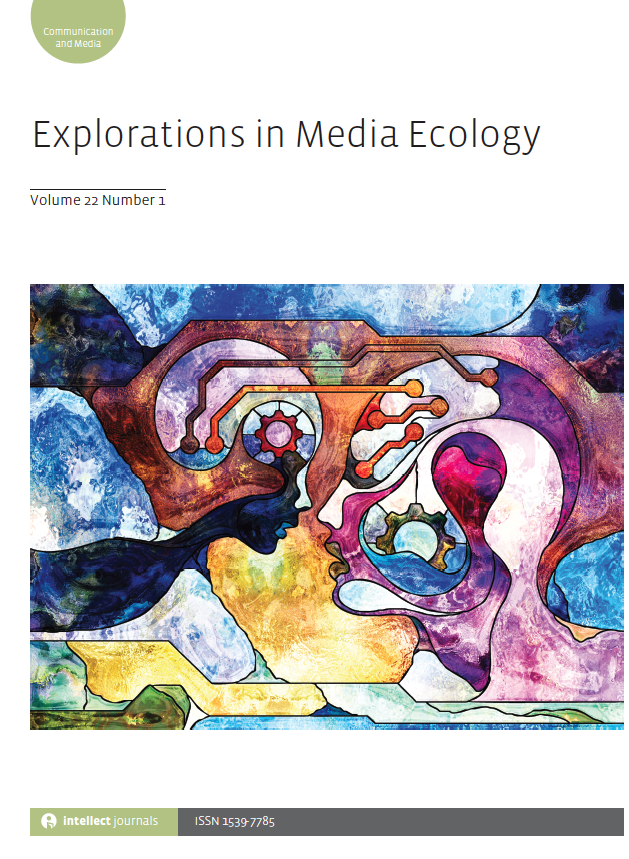- Home
- A-Z Publications
- Explorations in Media Ecology
- Previous Issues
- Volume 13, Issue 1, 2014
Explorations in Media Ecology - Volume 13, Issue 1, 2014
Volume 13, Issue 1, 2014
-
-
Diachronic phenomenology: A methodological thread within media ecology
More LessBy Corey AntonAbstractThis article identifies and outlines a method of thought and line of research that can be found throughout media ecology. The methodology and research line, ‘diachronic phenomenology’, explores the many ways that conscious life and social organization (in its essential dimensions, modalities, properties and functioning) resonates with particular environments and media forms, and correspondingly grows, develops and becomes itself. The article thus synthesizes and co-adapts media ecology and phenomenology: media ecology benefits from more robust phenomenological grounding and methodological considerations, while phenomenology benefits from recognizing how various noetic and eidetic economies, as well as invariant features of contemporary life, have been culturally and historically effected and affected by social environments and communicative forms (writing, currency, mirrors, clocks, drugs, etc.). The article walks through a wide range of samples and illustrations and then briefly identifies possible future directions by considering recent developments within the fields of brain science and embodied cognition.
-
-
-
As much through manner as through matter: The ‘Postmanist’ approach to social research
More LessBy Ellen RoseAbstractMarshall McLuhan’s mosaic style has been excessively scrutinized; however, the elegant prose of fellow media ecologist Neil Postman has garnered little attention. This article argues that what we find in Postman, if we look beyond the content of his work to the way in which it is presented, is an important philosophy and related approach to social research that can and should be abstracted from his treatments of advertising as parable, television as first curriculum, and technology as ideology. Intended as a counter to pseudo-scientific approaches, ‘Postmanist’ social research is undertaken not in order to amass data but ‘to contribute to human understanding and decency’ and ‘improve social life’.
-
-
-
Remote Control? The shaping of communities of tennis spectators through the BBC’s large TV screen coverage of Wimbledon
More LessAbstractIn 1997, the All England Lawn Tennis Club revealed the addition of a large TV screen facing the grassy embankment opposite Court One. The placement of this screen altered the nature of the live Wimbledon event, as well as spectators’ experience of it, and in the process constructed the incline as ‘Henman Hill’. Media ecology recognizes the dynamics of culture and social groups as intricately intertwined with communication and communication technologies. Unpacking how the BBC coverage of Wimbledon transforms the experiences of spectatorship and frames relations between different types of spectators helps explain this ‘medium’, in Marshall McLuhan’s words, as ‘a complex and effective set of events which change our outlook and the posture of entire groups of people’. I argue that understanding the variety of spectator identities and practices that emerge from technosocial situations such as Henman Hill poses unique opportunities and challenges for media ecologists.
-
-
-
Media gatekeepers and the rise of networked readers: Revisiting the contra-crack controversy
More LessAbstractThe San Jose Mercury News was at the cutting edge of new media journalism when it published its controversial series investigating ties between the CIA, the Nicaraguan Contras, and the flow of crack cocaine into poor Los Angeles neighbourhoods. The attack on the series by the print media elite and its failure to suppress the story’s spread through traditional modes of gatekeeping marked an important moment for journalism. This article examines the controversy within the context of our transition from a print-based to a digital culture and explores the emerging role of networked readers in knowledge production and legitimation.
-
-
-
Introducing Jacques Ellul to English education
More LessAbstractJacques Ellul’s sociological perspective on technological society has had a wide-ranging influence. His sociological and philosophical ideas provided a foundation for studies in media ecology. However, many English educators are unaware of Ellul’s ideas. This article aims to introduce Ellul to English education. As a seminal thinker in the media ecology tradition, Ellul’s writings greatly influenced Neil Postman. Postman is known for his work in English education. This article argues that English education would benefit from the perspectives of Ellul. After a brief introduction to Ellul, the article identifies some of Ellul’s main ideas, which can inform English education.
-
Volumes & issues
-
Volume 22 (2023)
-
Volume 21 (2022)
-
Volume 20 (2021)
-
Volume 19 (2020)
-
Volume 18 (2019)
-
Volume 17 (2018)
-
Volume 16 (2017)
-
Volume 15 (2016)
-
Volume 14 (2015)
-
Volume 13 (2014)
-
Volume 12 (2013)
-
Volume 11 (2012)
-
Volume 10 (2011)
-
Volume 9 (2010)
-
Volume 8 (2009)
-
Volume 7 (2008)
-
Volume 6 (2007)
-
Volume 5 (2006)
-
Volume 4 (2005)
-
Volume 3 (2004)
-
Volume 2 (2003)
-
Volume 1 (2002)
Most Read This Month


